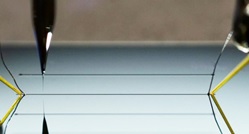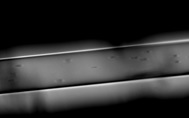Åsa Emmer
Professor
Details
Researcher
About me
I got my undergraduate education at Stockholm University, followed by employments as laboratory engineer in analytical chemistry at a pharmaceutical company and the Swedish Environmental Protection Agency. When I returned to academia, I performed my graduate studies at KTH in the department of Analytical Chemistry. After earning the doctoral degree, I stayed on at KTH as a researcher, assistant professor, associate professor and finally full professor.
Research
The main areas of research interest in my group are sample preparation, separation science, mass spectrometry, and miniaturization. This is applied on biosamples, biomolecules, and bioactive substances, with focus on obtaining selectivity, and sensitivity, while most often working with small volumes of very complex samples.
Below are some recent or ongoing projects briefly described.
Amyloid β-peptides (Aβ) are believed to contribute to the development of Alzheimer’s disease but they are inherently difficult to analyze depending on the tendency to form protofibrils. Therefore, we developed a method including several sample pretreatment steps and matrix assisted laser desorption/ionization mass spectrometry (MALDI-MS) analysis to detect Aβ in cerebrospinal fluid from patients. The use of microchannels and simulation was of importance in this work.

Microchannels with capillaries and electrodes
Similar types of molecules (protein nanofibrils) but from plant or rest products have recently been characterized with MALDI-MS in collaboration with researchers at the division of Applied Physical Chemistry, KTH.
Polyvinyl alcohol microbubbles (PVA-MBs), used as contrast agents for e.g. ultrasound imaging, constitute a completely different kind of analyte. Using capillary electrophoresis (CE), and conventional UV-detection or a UV area imaging detector, PVA-MBs have been analyzed in human plasma. This work was carried out in collaboration with researchers at the former School of Technology and Health, KTH, and the company developing the UV area imaging detector.

PVA-MBs migrating in a CE capillary
Combining different novel sample preparation methods with separation and/or MS is a frequent theme in our research. This has for example been utilized to analyze glycoproteins like osteopontin (OPN) and immunoglobulin G with MS. Here, new materials were also investigated for improved enrichment efficiency. This line of research is motivated by the fact that glycoproteins are of high interest in clinical and biomedical research since they have many important functions, and are also used as biomarkers and biopharmaceuticals. During this work we also recognized the importance of accurate MS calibration, and have e.g. evaluated new calibrants. We are involved in the ongoing IMI EU financed program iConsensus, where a number of European universities and companies develop analysis schemes and control systems to improve the bioprocess and manufacturing of biopharmaceuticals. We are contributing to Work Package 3 “CE chip platform” developing methods for different groups of analytes found in the culture media, and as WP leader.
In a VR financed project we collaborate with researchers at International Center of Insect Physiology and Ecology, icepe, Kenya. In this project methods for sample preparation, separation with gas chromatography (GC), and identification with MS is combined with bioassays in order to find semiochemical substances attracting egg-laying malaria mosquitos. Extracts from several graminoid plants are investigated in order to develop trap-and-kill units as a contribution to the efforts to fight this serious disease that affects hundreds of million people, and kills about half a million each year.
Another example of the use of separation together with sample treatment and characterization is the CE -MALDI-MS combination with on-target trypsin digestion in a study of butterfly reproduction proteins. Here, the sensitivity was an issue and a specially structured MALDI target plate was constructed to make detection of the analytes possible.

Water applied on a hydrophobically structured MALDI target
Teaching
I give lectures, tutorials, and lab projects etc in several courses, and is course responsible both for a master course and doctoral courses (see list below). Moreover, I have supervised/examined over 70 master thesis projects, and over 30 bachelor thesis projects. Some of these have been ERASMUS scholarship projects or similar.
In addition to teaching in courses, I am responsible for the mathematics/chemistry orientation of the program Master of Science in Engineering and in Education, and program director of the doctoral program Chemical Science and Engineering.
Courses
Analytical Chemistry (CK1290), teacher
Analytical Chemistry with Statistics (CK1295), teacher
Analytical Separations (KD2330), examiner, course responsible
Degree Project in Chemical Engineering and Technology, First Cycle (KH138X), examiner
Degree Project in Chemistry, Second Cycle (KD200X), examiner
Literature course for doctoral students (FCA3002), examiner
Literature course for doctoral students (FCA3001), examiner
Organic and Biochemical Analytical Separations (FCK3303), examiner, course responsible
Organic and Biochemical Analytical Separations (FCK3304), teacher, course responsible, examiner
Perspectives on Research and Innovation (KA1030), teacher
Perspectives on Research and Innovation (KA1040), teacher
Project in Chemistry (KD2910), examiner
Project in Chemistry (KD2920), examiner
Project in Chemistry (KD2905), examiner
Purification of Biomolecules (BB1210), teacher
Spectroscopic Tools for Chemistry (KD2320), teacher
Supervision Methodology for Undergraduate Projects (FKA3020), teacher
The Research front Line in analytical Chemistry (FCK3309), examiner